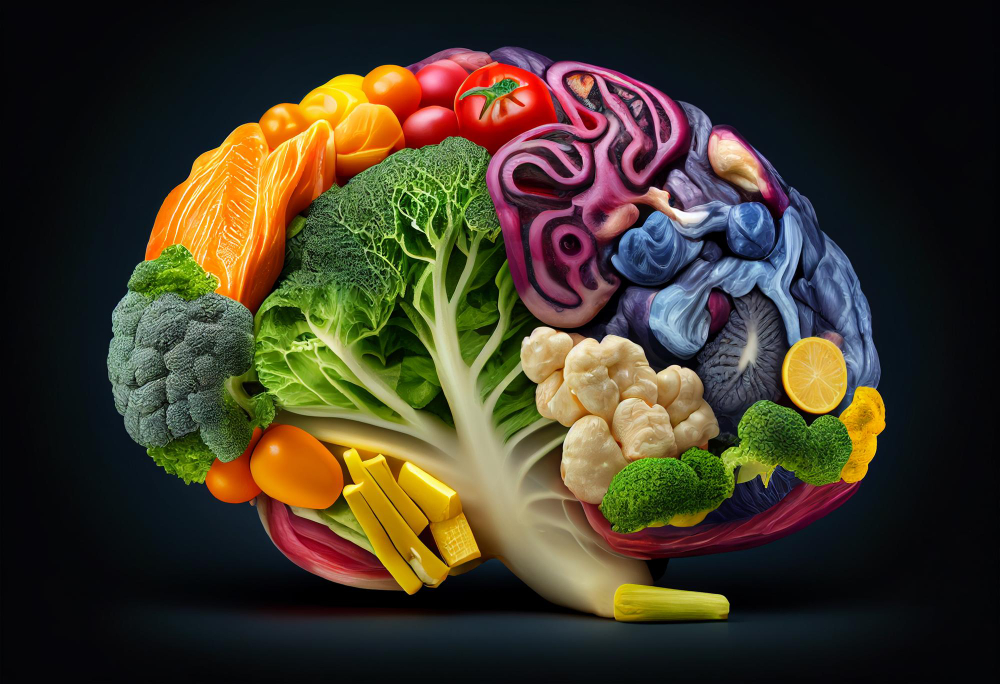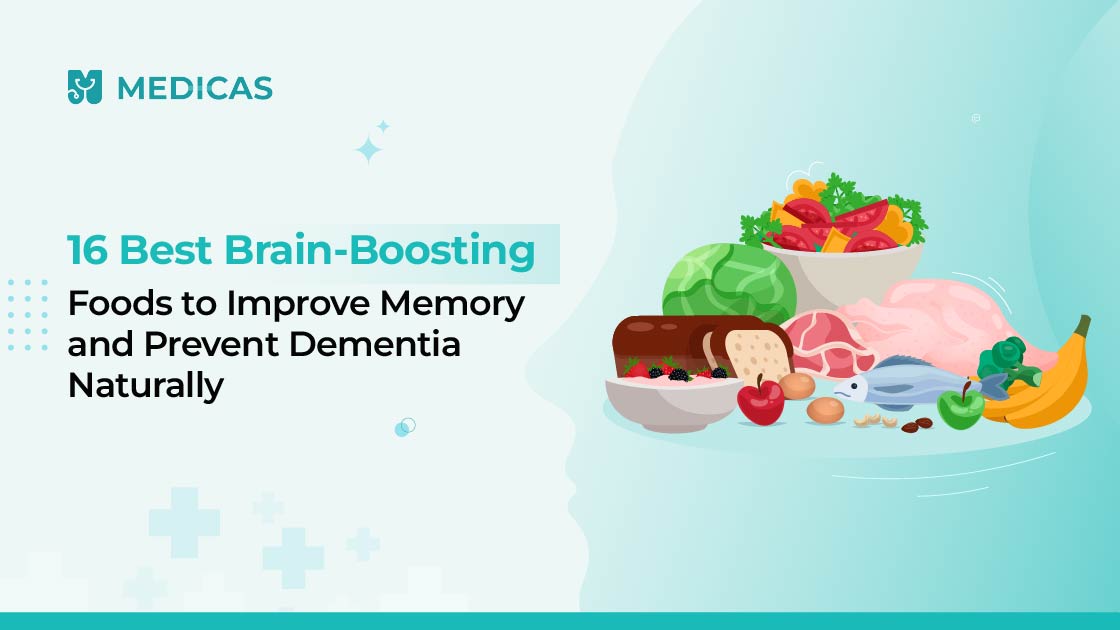As we progress through life, maintaining optimal brain health becomes essential—not just to avoid memory lapses but to actively protect against cognitive decline and dementia. Research shows that specific brain-boosting foods can help nourish the mind, sharpen memory, and even prevent early signs of dementia. These foods are rich in omega-3s, antioxidants, and brain-protective nutrients like vitamin B12, folate, and magnesium—all of which can help improve brain function naturally.
If you’re looking to take charge of your cognitive health or support a loved one, here’s a science-backed list of the best foods for brain health—and how you can get personalized diet guidance from experts at Medicas.
Why Diet Matters: How Foods Influence Brain Health and Dementia Risk
Your brain is a high-energy organ that demands proper nourishment. Just like the rest of your body, what you eat directly affects how well your brain functions—today and in the long run. Poor diet choices, such as processed foods high in sugar or saturated fats, have been linked to memory loss, mood swings, and increased risk of neurodegenerative conditions.
On the other hand, incorporating antioxidant rich foods, omega-3 rich foods, and magnesium rich foods can reduce inflammation, support neuroplasticity, and delay the onset of cognitive decline. In fact, several studies have shown that a balanced diet for brain health may significantly lower the risk of Alzheimer’s and other forms of dementia.
Need help figuring out the right plan for you?
👉 Consult Now with a certified dietitian
👉 Book an Appointment for a personalized brain-health diet

How to Improve Brain Function Naturally with Everyday Superfoods
You don’t need expensive supplements to improve memory power or focus. Many memory boosting foods are already in your kitchen. These brain foods for adults provide essential vitamins for brain health such as vitamin E, vitamin B12, and folate, while also supporting blood flow and reducing oxidative stress.
If you’re wondering how to improve memory power through diet, here’s where to begin:
- Avocado: This superfood is packed with healthy fats that support brain structure and blood flow. It also contains vitamin E, which has been linked to a reduced risk of Alzheimer’s disease.
- Beans: Beans are a great source of antioxidants, plant nutrients, and plant protein. They also contain iron and other minerals that support brain health. Studies have shown that regular bean consumption can increase longevity and reduce the risk of stroke, which shares risk factors with dementia.
- Blueberries: Berries, especially blueberries, and strawberries, have been shown to delay cognitive decline by up to two and a half years. These delicious fruits are rich in antioxidants that help protect the brain from damage.
- Broccoli: This cruciferous vegetable is rich in antioxidants and can help reverse damage caused by normal aging. Studies have shown that regular consumption of cruciferous vegetables can slow age-related memory decline.
- Coffee: Caffeine, which is found in coffee, has been shown to trigger the release of a substance that helps protect the brain. Coffee also contains potent antioxidants that help protect brain cells from damage.
- Dark chocolate: In its purest form (dark unprocessed cocoa or cacao nibs), chocolate is a great source of plant nutrients that can help relax arteries and improve blood flow to the brain.
- Extra virgin olive oil: This oil is an excellent source of healthy fatty acids and plant nutrients. Studies have demonstrated that it may lower the chances of experiencing cognitive impairment and neurodegenerative disorders.
- Linseeds: These seeds are rich in plant-based omega-3 fatty acids that help reduce inflammation and lower cholesterol levels. They also contain lignans, which protect blood vessels from inflammatory damage.
- Herbal tea: Mint, lemon balm, and hibiscus teas are all anti-inflammatory and can help support brain health.
- Herbs: The addition of fresh or dried herbs like coriander, dill, rosemary, thyme, oregano, basil, mint, and parsley to your diet can provide you with ten times more antioxidants compared to nuts and berries. They also have anti-inflammatory properties that support brain health.
- Leafy green vegetables: These veggies are a rich source of antioxidants that have been associated with brain health. Incorporate more spinach, kale, and collard greens into your diet for optimal brain health.
- Nuts: Nuts are a great source of healthy unsaturated fats, which have been found by multiple studies to reduce the risk of Alzheimer’s disease. They’re also a good source of vitamin E, which has been linked to improved brain health.
- Mushrooms: Fresh, dried, or powdered mushrooms can help reduce inflammation in the blood vessels of the brain. Brown mushrooms, in particular, are an excellent source of vitamin B12, which is linked to a lowered risk of Alzheimer’s disease.
- Quinoa: This nutrient-rich complete protein source is also a great source of fiber, vitamin E, and minerals such as zinc, phosphorus, and selenium. These essential building blocks are crucial for brain cells and their supporting structures.
- Seeds: Seeds are high in vitamin E and other brain-boosting minerals. Add flaxseeds, chia seeds, or pumpkin seeds to your diet for an added brain boost.
- Spices: Incorporating spices into our diet can greatly benefit the brain as they are rich in antioxidants and can effectively support the brain’s natural detoxification process. Cinnamon, cloves, marjoram.
How to get personalised guidance?
Every brain is different. Your genetics, age, stress levels, and pre-existing conditions influence how your brain responds to food. If you’re concerned about early signs of dementia or just want to improve brain function naturally, consulting a professional can make all the difference.
At Medicas, we offer access to expert nutritionists and dieticians from across the country who can help you create like create personalized diet plans based on your needs and lifestyle.
Frequently Asked Questions (FAQs)
How to improve memory power naturally through diet?
You can improve memory power naturally by incorporating brain-boosting foods rich in antioxidants, healthy fats, vitamins, and minerals. Focus on foods like blueberries, nuts, seeds, olive oil, fatty fish, and leafy greens. These foods reduce inflammation, support neural connections, and enhance brain plasticity, naturally improving memory over time.
Which foods are good for brain health and memory?
Foods good for brain health and memory include avocados, walnuts, blueberries, dark chocolate, olive oil, flaxseeds, quinoa, and green leafy vegetables. These are rich in vitamins for brain health such as vitamin E, vitamin K, folate, and omega-3 fatty acids.
What are magnesium-rich foods that support brain function?
Quinoa, pumpkin seeds, almonds, spinach, and black beans are excellent magnesium-rich foods that support cognitive performance, reduce stress, and promote better sleep—all crucial for brain health.
Which omega-3 rich foods help improve brain function?
Flaxseeds, chia seeds, walnuts, and extra virgin olive oil are powerful omega-3 rich foods that help build and repair brain cells, improve memory, and reduce the risk of cognitive disorders.
What are the top antioxidant-rich foods for brain health?
Blueberries, broccoli, dark chocolate, green tea, herbs, and spices like cinnamon and cloves are among the most potent antioxidant-rich foods. They help combat oxidative stress and inflammation in the brain, protecting against age-related decline.
How do folate-rich foods help in preventing memory decline?
Leafy greens, legumes, asparagus, and avocados are folate-rich foods that support brain cell function and repair. Folate deficiency has been linked to memory loss and slower cognitive processing, especially in older adults.
How can vitamin B12 help improve memory and brain function?
Vitamin B12 for memory is essential because it helps produce neurotransmitters and maintain healthy nerve cells. Foods like eggs, mushrooms, fortified cereals, and dairy products can support cognitive clarity and reduce the risk of neurological issues, including memory loss.
Related Blogs
Disclaimer
professional for personalized guidance regarding your specific medical condition.
Accuracy of Information: While we strive to provide accurate and up-to-date information, the field of medicine and viral fevers is constantly evolving. The content in this blog post may not reflect the most current research or medical guidelines. Therefore, it is advisable to cross-check any information provided with reliable sources or consult a healthcare professional.
Individual Variations: The symptoms, causes, treatment options, and preventive measures discussed in this blog post are general in nature and may not apply to everyone. It is important to remember that each individual’s situation is unique, and personalized medical advice should be sought when making healthcare decisions.
External Links: This blog post may contain links to external websites or resources for additional information. However, we do not endorse or have control over the content of these third-party websites. Accessing these links is done at your own risk, and we are not responsible for any consequences or damages that may arise from visiting these external sources.
Results May Vary: The effectiveness of treatment options or preventive measures mentioned in this blog post may vary from person to person. What works for one individual may not work the same way for another. It is essential to consult with a healthcare professional for personalized advice tailored to your specific needs.
Dr. Neha Suryawanshi, a proficient dietitian, brings valuable expertise from her tenure at VLCC Health Care Pvt. Ltd. and Snap Fitness in Mumbai. She honed her skills through an internship at Jehangir Hospital in Pune. Currently, Dr. Suryawanshi serves as an online diet consultant and passionate nutrition blogger. Book Appointment with Dr. Neha Suryawanshi


